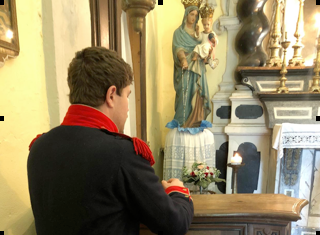”Christian, Catholic, Apostolic, Roman”: the voice of Napoleon I of France prompted by the question “Majesty, are you a believer?” is crystal clear. The Emperor’s analysis of faith was illustrated by Father Angelo Bellon: the masterclass exposed by the Dominican theologian is rotated on the memories of talks intertwined by the leader to the French Generals established on the Atlantic island of Saint Helena to live fidelity and self-denial together with the illustrious exile.
“Majesty, who is God?”. Napoleon’s opinion was introduced by the metaphor to accentuate the uniqueness: ”Any disoriented General on the battlefield warns the elected political and military genius to break the deadlock. God is everywhere and my horror is declared to the insensitive atheists and materialists opposite the presence extended to Christian nature and mysteries. The religion hears the conscience that is the word of God and separates good from evil: this is the most powerful force to introduce the concept of morality and the best relief to the dying. The target to restore Catholicism eclipsed by the French Revolution was bolder than any effort to win the armed battles”.
The divinity of Jesus Christ was reaffirmed by the leader: “Jesus is the only messenger of God: the analogy to any man is incredible. The uniqueness of Christ is infinite. The Old Testament exhibits 300 prophecies (later fulfilled) to narrate the extraordinary life of Jesus: from birth (God incarnate in Mary) to omnipotence over the universe (nature, matter, disease, death, devil) and to the dogma on extraneousness to sin (cf. Jn 8,46). The story of founders of religions other than Catholicism has not been revealed. Anyone can assimilate the voice of Jesus: Catholicism is the only religion reaching to the heart to sanctify the soul”.
The freedom separated from life is harmful in the eyes of Napoleon Bonaparte immune to the siren lit by Protestantism to separate the Papacy from Rome to the nineteenth century: “The Church, survives to every civilization, is inclined to the discipline indispensable also to the virtuous growth for the man attracted by the natural nature, individualism, anarchy”.
”Ajaccio is my city. There I had met Jesus at the Holy Mass of First Communion: then it was the most beautiful day for me”. The spiritual phrase was uttered by Emperor Napoleon I of France to the catechesis offered to the children of Generals established on the Atlantic island to watch over the last exile. The Catholic education imparted to the child Napoleon Bonaparte and muffled on the throne (the power stuns the man) has always been defended by the attitude: the presence at the Sunday Mass in Paris, the deference addressed to Popes Pius VI and Pius VII imprisoned and humiliated by the French militia, the prescriptions given to the priest Angelo Vignali. The reverend was instructed by the exiled leader to place the crucifix on the body and the altar adjacent to the skull, every day from death to burial reciting the mass, the most holy sacrament, seven penitential psalms. The superior power conferred on the priest placed in the confessional was the brake then removed to the confession for Napoleon: Penance was administered (20 April and 3 May 1821) together with the anointing of the sick to the emperor exhausted by the uninterrupted regurgitation and, therefore, prevented from receiving the Eucharist. Bonaparte’s happiness for having fulfilled every duty emerged from the four-hour phase lived only with Abbot Vignali also to nourish the predisposition to forgive and accept the will of God. The last formula uttered from the voice of Napoleon was “My God”.
The Mass celebrated by the Dominican priest at the church in the ancient village of Marengo incorporated in the residence owned and inhabited by the Cellerino family was subsequent to the lectio magistralis appreciated by the national president Alfonso Luzzi (Movement Christian workers – MCL) intervened on Internet from Rome to utter the greeting and to thank very much Piercarlo Fabbio (provincial president Mcl -Alessandria) and Efrem Bovo (vice-president to the Circle Santa Maria di Castello).

